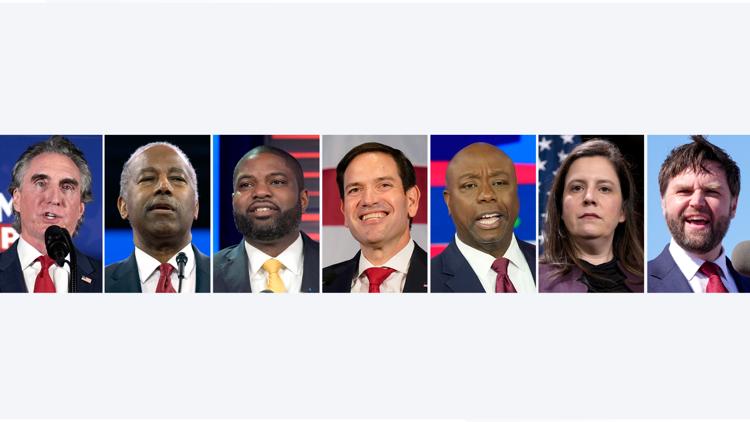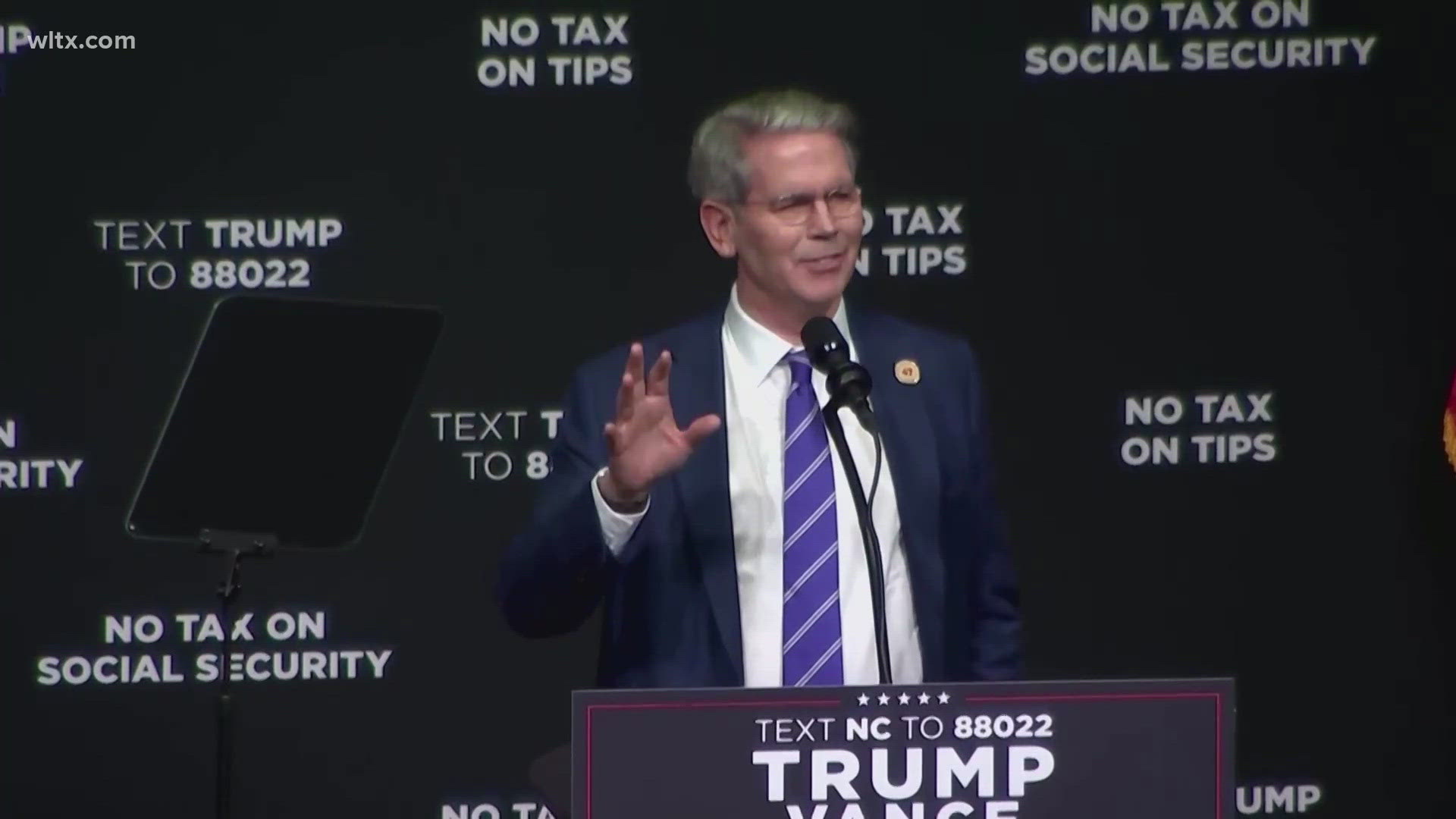NEW YORK — Donald Trump has narrowed his vice presidential shortlist to a handful of contenders as he prepares to announce his pick in the days before — or perhaps even at — next month’s Republican National Convention.
He told reporters Saturday that he already has made his decision and that the person will be in attendance Thursday night in Atlanta at the first debate of the general election campaign against Democratic President Joe Biden.
Trump's choice would likely become the immediate front-runner for the Republican presidential nomination four years from now if Trump were to win a second term, the constitutional limit. But that No. 2 will be under immense pressure from Trump and his allies to show loyalty at all times.
Trump turned on his first vice president, Mike Pence, after Pence rebuffed his boss’ efforts to overturn the results of the 2020 election, based on false theories promoted by the then-president after his loss to Biden.
Pence has declined to endorse Trump this time around.
Trump has said his top consideration for a vice president is whether someone is qualified to take over as commander in chief.
But other factors at play: Who can raise money? Who performs well on television? Who will be most effective on the debate stage against Vice President Kamala Harris? Who risks overshadowing Trump, as a lame-duck if he is elected in November, with talk soon of 2028? And who has “the look"?
Trump's campaign has repeatedly cautioned that anyone "claiming to know who or when President Trump will choose his VP is lying, unless the person is named Donald J. Trump.”
And given Trump's penchant for unpredictability and drama, the best-laid plans could change.
A look at the top contenders heading into the convention in Milwaukee that will begin July 15.
Trump likes rich people. North Dakota's two-term governor is most definitely rich.
Before his time as governor, Burgum led a software company that was acquired by Microsoft for more than $1 billion. He also has worked in real estate development and venture capital and spent millions on his own White House bid.
Burgum had initially run against Trump for the 2024 nomination, but the little-known governor from a sparsely-populated state gained little traction. When Burgum dropped his bid, he quickly endorsed the former president. Since then, Burgum has become one of Trump’s most visible defenders, appearing frequently on television, joining him at fundraisers, and traveling to New York for Trump's criminal trial.
But more than that, Trump and Burgum have hit it off personally.
Burgum and his wife, Kathryn, are said to get along especially well with Trump and his team — the kind of rapport that has particular currency in Trump's orbit. It does not hurt that Trump thinks Burgum looks the part — a “central casting” pick.
Selecting Burgum would, in some ways, echo Pence: a staid, uncontroversial governor with lesser national name recognition. Burgum, 67, would be unlikely to compete with Trump for the spotlight or to immediately overshadow him with 2028 talk.
Burgum also brings money and rich friends to the table.
But does the Republican Party want two older white guys atop the ticket?
Swept to national prominence by his bestselling memoir, “Hillbilly Elegy,” Vance has held office for less than two years. But during his short time in the Senate, the former venture capitalist from Ohio has established himself as one of the fiercest defenders of Trump's “Make America Great Again” agenda, especially when it comes to foreign policy, trade and immigration.
Despite his early criticism of Trump, Vance has become personally close with the former president and his son Donald Trump Jr., who has talked up the senator. Vance has become a fixture of the conservative media circuit, frequently spars with reporters on Capitol Hill and has appeared with Trump at recent fundraisers and at court.
At 39, Vance, would inject some millennial energy into a race that features an 81-year-old (Biden) and a 78-year-old (Trump) at the top of the major parties' tickets. And a debate with Harris would certainly be heated.
But will Trump be able to get over Vance's record of past insults, which he mentions still?
In 2016, Vance was one of Trump's fiercest critics, casting the then-reality TV star as “a total fraud" and “moral disaster” and calling him “America’s Hitler."
Vance has said he was proved wrong by Trump’s performance in office and the senator now castigates the liberals who made his book a bestseller as they sought a window into understanding Trumpism.
If picking Vance would excite Trump's base, choosing the Florida senator might expand the ticket's appeal, particularly among deep-pocketed donors and more establishment-minded and moderate Republicans turned off by Trump's rhetoric and extremism.
Rubio, once seen as a GOP hotshot, is now a well-respected voice on foreign policy and national security issues in his party. The son of Cuban immigrants, he speaks Spanish and could help Trump win over the Hispanic voters that his campaign is eagerly courting.
Rubio is also seen as a skilled debater who could hold his own against Harris.
Running alongside Trump might once have seemed unlikely possibility, given that the two were bitter rivals in 2016 for the GOP nomination and viciously attacked one another. Trump belittled Rubio as “Little Marco,” mocked him for drinking water during speeches and called him a “nervous basket case," who was “disgusting." Rubio said Trump was a “con man” who tried to “swindle” the Republican Party and Rubio tried to question Trump's manhood.
“You know what they say about men with small hands,” Rubio quipped at one point during that campaign.
But then there is Rubio’s Florida "problem,” as Trump has called it.
The Constitution says two candidates from the same state cannot run as president and vice president, meaning Rubio would need to change his residency — something he is reportedly willing to do.
But does he really want the job? Rubio has been noticeably less present, publicly, than some of the others vying to be Trump's No. 2 and did not appear with Trump at his criminal trial.
The only Black Republican in the Senate, the South Carolinian would bring racial and stylistic diversity to the GOP ticket as well as a preacher's touch. The self-described “born-again believer” often quotes Scripture in political speeches that often reach a crescendo of call-and-response.
Scott and Trump worked closely together while Trump was in the White House on a host of policy issues, including Trump's tax cuts, opportunity zones, and criminal justice reform legislation.
Though Scott ran against Trump for the nomination this year, the senator largely declined to criticize the former president. After failing to gain traction despite millions spent on his behalf by high-profile donors, Scott endorsed Trump over fellow South Carolinian Nikki Haley, Trump's U.N. ambassador, and immediately began enthusiastically campaigning across New Hampshire and South Carolina on Trump's behalf.
He continues to make frequent appearances on television and recently launched a $14 million campaign to win over minority voters in seven key swing states.
Trump has often joked that Scott has made a far better surrogate than he did a candidate.
But that has also raised questions about how Scott might perform on a debate stage with Harris later this year.
The only woman on his shortlist, the New York congresswoman could help Trump win over skeptical college-educated and suburban women who sided with Biden in 2020.
Stefanik was once an aide to former House Speaker Paul Ryan and served in President George W. Bush's White House, working for two Republicans now shunned by Trump loyalists. But she transformed during Trump's four years in office into a fully-fledged Trump acolyte.
She defended him vigorously in both of his impeachment trials and railed against his criminal indictments. In 2022, Stefanik was the first member of Republican House leadership to endorse Trump's campaign, and did so before he had even announced.
She saw her profile rise after her aggressive questioning in December of a trio of university presidents over antisemitism on campus that led to two of their resignations. Trump has repeatedly praised that performance.
Stefanik has spent years ingratiating herself with Trump and positioning herself as one of his most trusted allies and confidantes on Capitol Hill. And at 39, she would bring new energy to the ticket.
But is the leap from House member to VP too big?
Relationships and trust matter to Trump. Carson, who served as secretary of housing and urban development during Trump's administration, has developed a strong bond with the former president over the years, despite a contentious start as 2016 rivals.
A soft-spoken former renowned neurosurgeon, Carson, 72, could help Trump win over minority voters as the first Black person to be named to a Republican presidential ticket. Given Carson's age and demeanor, there is little chance of him overshadowing Trump or stealing the spotlight.
But Carson also has a history of controversial comments on abortion, guns and other issues that could cause headaches for the ticket.
The Florida congressman has become one of Trump's most prominent conservative Black supporters and a reliable surrogate on television and at events.
His selection could help bolster Trump's appeal with Black voters, especially the younger Black men that the campaign has been courting as it tries to eat into Biden's 2020 coalition.
At 45, Donalds is also the kind of fresh face who would serve a marked contrast to the men at the top of both parties' tickets.
But like Rubio, Donalds would likely need to move to join the ticket. And he, too, has a history of controversial statements, including at a recent “Congress, Cognac, and Cigars” event in Philadelphia, where he seemed to reflect favorably on the Jim Crow era as he talked about “the reinvigoration” of the Black family.
“You see, during Jim Crow, the Black family was together. During Jim Crow, more Black people were not just conservative — Black people always have been conservative-minded — but more Black people voted conservatively,” Donalds said, according to audio from the Philadelphia Inquirer.



